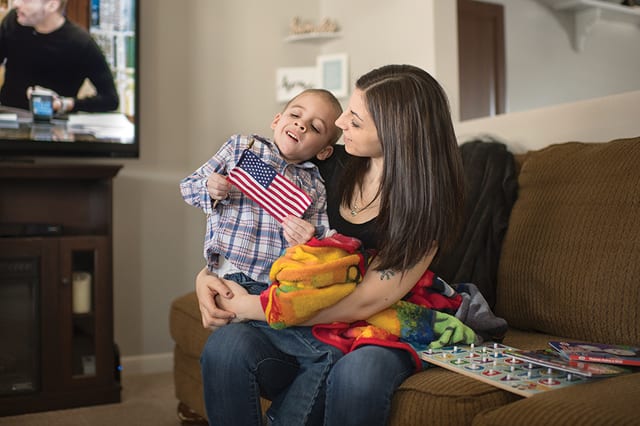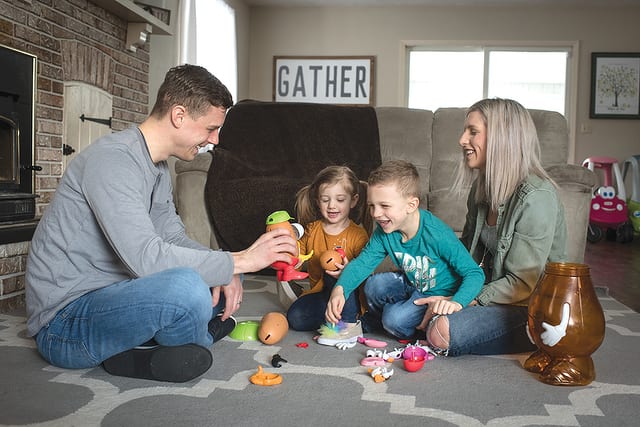When their son Landon was diagnosed with autism, Nickie and Mike Potter of Julian felt somewhat helpless.
Initially, after Landon’s diagnosis, Nickie felt like she and Mike went through the stages of grief, from denial to anger and sadness to mourning for their son’s life and future. Everything seemed out of their control.
“We felt like there was nothing we could do to help our child,” she says.
Fortunately, Centre County has a number of schools and organizations that provide services for families of children with autism, as the Potters learned.
“It wasn’t until we started focusing on the ‘here and now’ that we were able to identify the tools and support systems around us and finally saw a path forward,” Potter says.
It’s a path more and more families are following.
Since the first National Autism Awareness Month in April 1970, autism has become the fastest-growing developmental disability in the world, with the diagnosis rate of children increasing from 1 in every 2,000 in the 1970s and 1980s to 1 in every 59 children today with an autism spectrum disorder, according to the Centers for Disease Control and Prevention.
Autism spectrum disorder refers to a broad range of conditions characterized by challenges with social skills, repetitive behaviors, speech, and nonverbal communication, according to Autism Speaks, an advocacy organization.
As of 2015, autism was estimated to affect 24.8 million people worldwide.
Landon receives support services – speech, occupational therapy, and physical therapy – from the school district, where he is in mainstream kindergarten.
The Potters started out with early intervention with speech and individual instruction therapy when Landon was 2 years old, and once he turned 3, he went to Easter Seals for its integrated preschool until he turned 5. Half of the kids were typical functioning and half were children with special needs.
“We also did private speech therapy and ABA (applied behavior analysis) from the Journey Center in Bellefonte as well,” Potter says. “He still has a behavior specialist from the Journey Center that checks in with him monthly at school to assure that his needs are being met, but he will be graduating from their services this summer.”
The Journey Center offers treatment for children displaying symptoms of behavioral and/or developmental delays, in a Christian environment. It aims to reassure parents that they and their children with autism are not alone.
Kim Bennett, director of the Journey Center says, “One of my greatest joys is to hear a child with autism say their first word, years after most children learn to speak. My passion is to advocate for the children that have no voice of their own.”
Through lots of research, the Potters were surprised to learn about the services that are out there for children on the spectrum in this area. Every child and case is unique, so it was important for them to find a good fit for Landon – and sometimes that came with trial and error.
“We were able to find a team of people that supported us and him,” Potter says. “I like to think of them as ‘believers’ who believe in your child, see their potential, their triggers, their strengths and weaknesses, the ones who are constantly thinking outside of the box and making changes to best support your child. We were lucky enough to find them here, at home, in Happy Valley. I know 100 percent that Landon would not be making the strides he is today without the help of these services, these service providers, and seeking help at an early age.”
Strawberry Fields Inc. in State College offers an early intervention program that provides supports and therapy services designed to meet the needs of infants and toddlers with developmental delays.
“Strawberry Fields’ early intervention program serves many children each year who have autism,” says Annie Smith, Kids First early intervention director.
“Strawberry Fields employees 17 therapists and teachers to provide physical therapy, occupational therapy, speech therapy, and special instruction to children age 0-3 years. Therapists and teachers work with families of young children, coaching them in strategies to enhance their child’s development. Our therapists and teachers are trained to recognize the early signs of social communication disorders, autism, and other developmental delays.
“Through a collaboration with service coordinators from Centre County Early Intervention, independent evaluators, and other provider agencies, all children age 6 months to 3 years are being screened for autism and other
social communication disorders. The theme for this collaboration is ‘It Takes a Village,’ and invaluable connections have been made with other service providers, physicians, therapists, schools, and developmental specialists.”
Among the local schools that work with students on the autism spectrum is Soaring Heights School in State College. SHS is for students in grades K through 12 and its program is based on applied behavioral analysis, according to John Dibert, K-12 principal and program director.
“We work on socialization and academic instructions through a combination of research-based strategies,” Dibert says. “We offer transition services for students who are 14 years and up, so students have a plan in place upon graduation for post high school education, college programming, job placement, and training. We work with local agencies such as ACRES Project, OVR (the state Office of Vocational Rehabilitation), local businesses, etc., so students are able to successfully transition from high school to the workforce and the community at large.”
The ACRES Project – Adults Creating Residential and Employment Solutions – is a State College nonprofit working to foster independence, self-advocacy, and work and life skills for adults with autism.
Angela and Josh Mundy of Centre Hall have a son who was diagnosed at age 2.
The Mundys thought Daxtin might have autism because he was not making eye contact and did not speak.
“He didn’t say anything,” she says. “Typically, at that age, they know about 10 words, and he didn’t know any of them.”
Daxtin goes to Matternville Preschool Center in Port Matilda, which offers classes for kids with autism. He is now in his second year there.
“He is doing very well, and he makes good eye contact now,” Mundy says. “He still doesn’t respond by name, but he’s very smart. He knows when you’re trying to get his attention. He just doesn’t reply to it. He’s not putting sentences together, but he is starting to talk – he is saying words.”
Daxtin started speaking around Christmastime.
“Now he’s just taking off with it,” Mundy says. “He loves the alphabet, and he loves the show called Bubble Guppies on Nick Jr. That show has taught him a lot of stuff. He also has a lot of apps on his tablet for autism that have really helped him.”
In addition to his schooling locally, the Mundys take Daxtin to an autism research center in Lewisburg.
“We took him there when he turned 3, and he goes every six months to be checked to see where his progress is,” Mundy says. “His last visit was in January and they couldn’t believe how much he had changed from July 2018 to January of this year.”

Melody and Joshua Johnsonbaugh, former Centre County residents who now live in Searcy, Arkansas, have three children, all boys, with a girl due in May. Their two older sons, Zander-lee, 6, and Maxtyn, almost 4, have both been diagnosed with autism; Zander is non-verbal.
“It is such a wide spectrum,” she says. “The most important thing to know is, if you’ve met one person with autism, then you’ve met one person with autism. Because every case is so vastly unique in its own way. There are definitely similarities, but each situation is so different.”
Johnsonbaugh says she always must be on her toes with her sons and watch them constantly, especially her oldest.
“He doesn’t understand when he should be afraid of certain things, such as a busy road,” she says. “But he is incredibly smart and curious. He can get out of anything – doors, gates, child locks, seat belts, car seats. Nothing stands a chance with him. He has figured out how to work everything and doesn’t understand why it’s important to stay where he is.”
Johnsonbaugh says her older boys have uncommon and unrealistic fears and major sensory issues about different things, such as animals, clothes, and food.
“All kinds of daily tasks just simply cannot be completed without a physical fight or some pinning down,” she says. “It is generally not a fun time. But, when we accomplish something, no matter how small, it is like we just conquered the world.”
Johnsonbaugh says it is not the motherhood she imagined.
“There are many things that my husband and I always dreamed of doing with our children,” she says. “That just isn’t our reality anymore.”
Johnsonbaugh says there are many fears that she never would have thought about if she had never had her boys.
“The biggest fear of a special-needs parent is, what is going to happen to their child after they are gone?” she says. “Who will take care of them? How will they get by? Is a home the only choice we have? Is anyone in our lives willing and able to handle them, once we are gone?
“Although that’s a hard pill to swallow, those boys have taught me more than I could have ever imagined learning. I know that God gave us these children to teach us different things and to help us make a difference in the special-needs world. I couldn’t be more grateful for the opportunity to raise such amazing little people that are teaching us such incredible, big lessons.”
Landon has also taught the Potters so much about life, patience, unconditional love, keeping the faith, and taking the time to slow down.
“He has made so many amazing leaps and bounds because of his hard work and the dedication of many amazing people,” Nickie Potter says. “I also know that he has to continue to work hard for things that come naturally to so many other kids, but he has the tools and the character to overcome those obstacles. He may have a diagnosis, but it is just a small part of who he is and who he will be.”
Potter says their biggest takeaway from this experience has been to be proactive early and always advocate for your child, to celebrate all the small things because they lead to huge leaps, and that there is a path forward.
“It has been a roller coaster of ups and downs along the way, but we have been finding the joy in the ride!” she says.
Jason Klose is a freelance writer in Mifflinburg.



